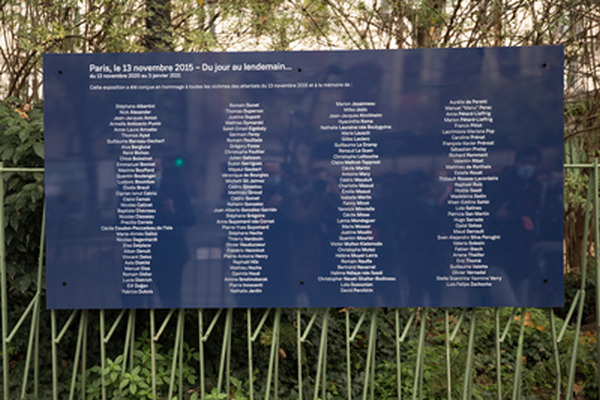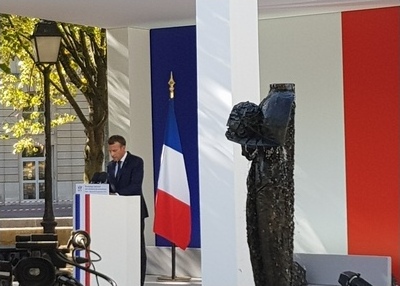
This initiative is part of a set of policies established by successive governments after the 2015 attacks. Their aim has been to enshrine the memory of victims of terrorism and foster a better understanding of this unique form of violence and its consequences.
A terrorist attack, like any act of extreme violence targeting a group, is potentially traumatizing for the victims and society as a whole. Paying tribute to the victims is therefore vital to the nation since the target of these acts is the community—be it the nation, the republic, or the state. Offering the general public a tangible space for empathy toward victims, learning, and expression, as well as uncertainty, passion, conflict, and questioning, is fundamental.
A Memorial Committee was created by the Délégation interministérielle à l’aide aux victimes (DIAV) in 2018 to reflect on how to commemorate the different terrorist attacks in France. This committee was made up of different experts: historians, scientists, sociologists, philosophers, representatives from the Ministries of Justice, the Armed Forces, and National Education. The committee published a report in 2019 with fourteen recommendations, which serve as the basis for the Museum and Memorial of Terrorism:

-
In line with current legislation, prioritize the archiving of all documentation related to terrorist attacks.
-
Authorize the filming of the main trials in matters of terrorism.
-
Encourage reflections on the consequences of repeatedly showing some images, particularly by 24-hour news channels. Develop content for school curricula to encourage critical thinking on terrorism as it is portrayed in the media and on social media.
-
Include the issue of terrorist attacks in future school curricula (final year of general, technical, and professional high school tracks), with a geopolitical, multi-scale (world, European, French), and multidisciplinary (history and geography at the forefront) approach.
-
Create a Museum and Memorial for Societies Facing Terrorism in Paris; making sure to take a global perspective.
-
Provide training within the Museum and Memorial to specific groups, particularly those involved in responding to terrorist events: police, legal authorities, educators, first responders, care personnel.
-
Put together a team for the preliminary phase for the Museum and Memorial. The team will be made up of three bodies: memorial, scientific, and educational.
-
Inscribe the names of all the victims of all terrorist attacks within the Museum and Memorial. The medium should be in line with the wishes of families and loved ones.
-
Provide visitors with a space for reflection within the Museum and Memorial. This could take the form of a memorial garden.
-
Encourage the Museum and Memorial to reach out to similar existing or future memorials in France, Europe, and around the world.
-
Consult victims’ associations and victim support organizations on a regular basis and throughout the development of the Museum and Memorial.
-
Opt for this legal framework for the Museum and Memorial: Etablissement Public de Coopération Culturelle à caractère administratif (EPCC).
-
Study the possibility of establishing the Museum and Memorial on Ile de la Cité in the offices of the former Paris courthouse.
-
Make March 11th the commemoration date to cohere with the European date, taking into account all attacks that have affected France since the 1970s.
On June 15, 2020, on the basis of this report, the French president entrusted the historian Henry Rousso with chairing the team tasked with designing a scientific and cultural program and finding a location. The scientific and cultural program was submitted on March 11, 2022, on the French National Day for Victims of Terrorism.
Après l'attentat, la protection civile à Nice, 22 octobre 2017, France 3 Régions © Ina

